2022年牛津深圳版英语中考语法复习课件—句式变化专题 (共18张PPT)
文档属性
| 名称 | 2022年牛津深圳版英语中考语法复习课件—句式变化专题 (共18张PPT) | 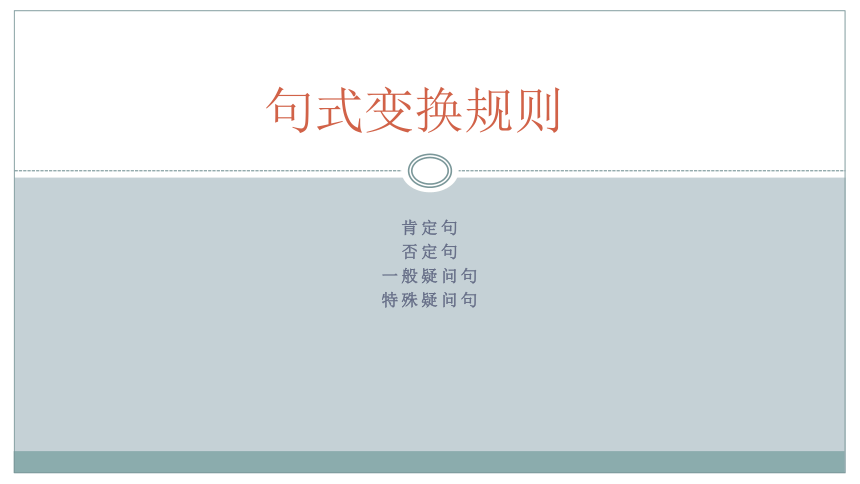 | |
| 格式 | zip | ||
| 文件大小 | 111.9KB | ||
| 资源类型 | 教案 | ||
| 版本资源 | 牛津译林版 | ||
| 科目 | 英语 | ||
| 更新时间 | 2022-05-12 06:37:14 | ||
图片预览

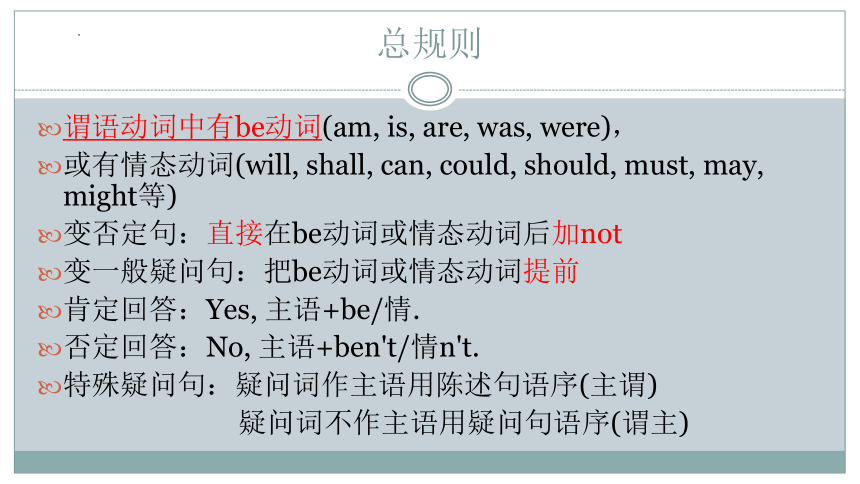
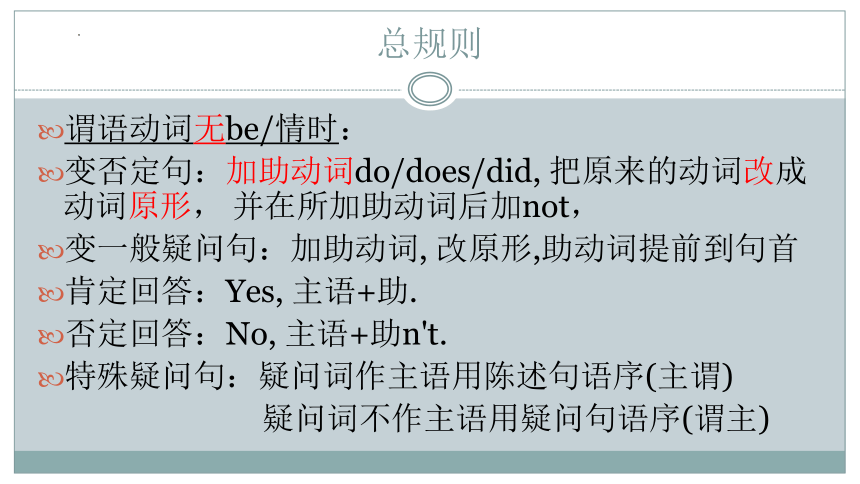
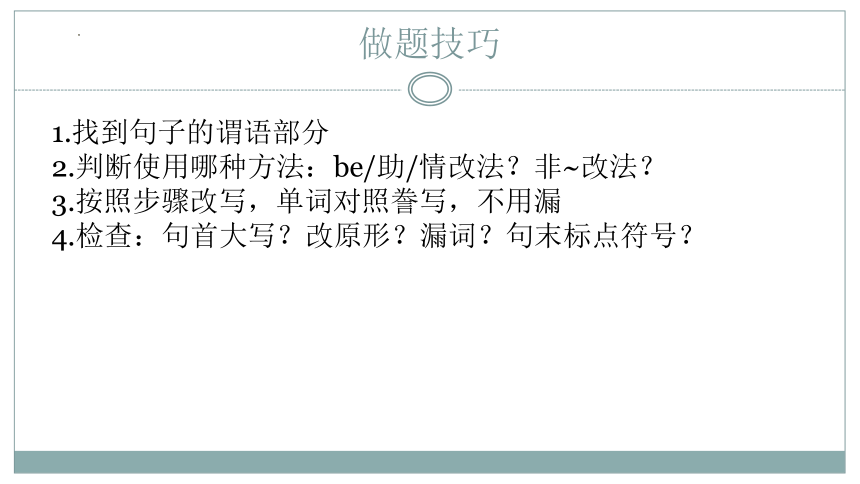
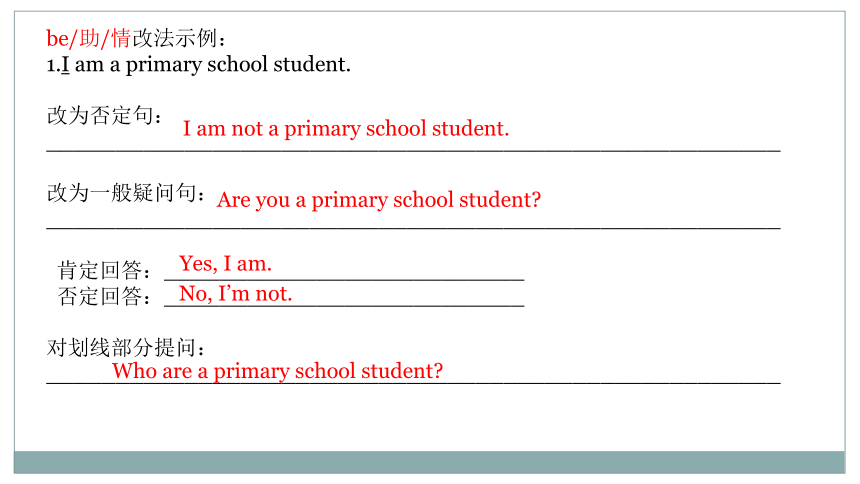
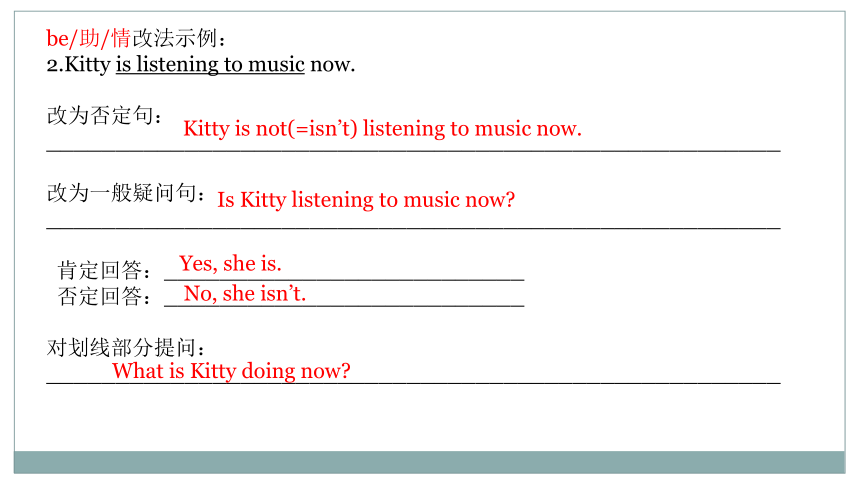
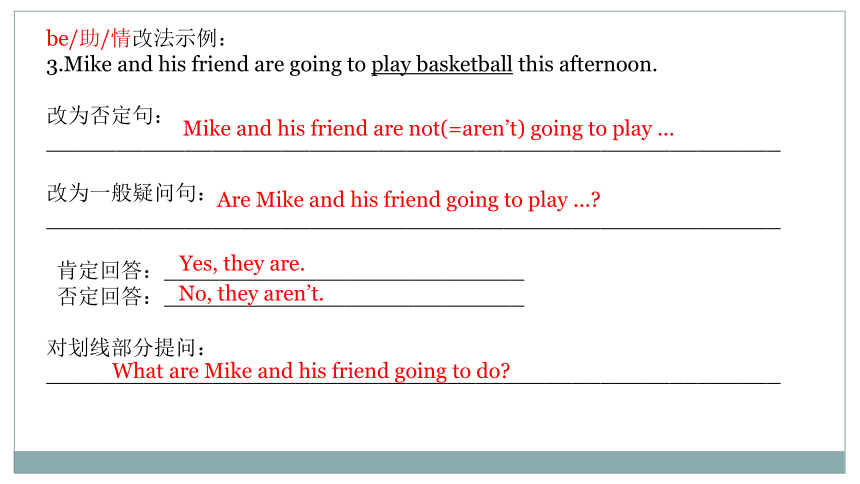
文档简介
(共18张PPT)
肯定句
否定句
一般疑问句
特殊疑问句
句式变换规则
总规则
谓语动词中有be动词(am, is, are, was, were),
或有情态动词(will, shall, can, could, should, must, may, might等)
变否定句:直接在be动词或情态动词后加not
变一般疑问句:把be动词或情态动词提前
肯定回答:Yes, 主语+be/情.
否定回答:No, 主语+ben't/情n't.
特殊疑问句:疑问词作主语用陈述句语序(主谓)
疑问词不作主语用疑问句语序(谓主)
总规则
谓语动词无be/情时:
变否定句:加助动词do/does/did, 把原来的动词改成动词原形, 并在所加助动词后加not,
变一般疑问句:加助动词, 改原形,助动词提前到句首
肯定回答:Yes, 主语+助.
否定回答:No, 主语+助n't.
特殊疑问句:疑问词作主语用陈述句语序(主谓)
疑问词不作主语用疑问句语序(谓主)
做题技巧
1.找到句子的谓语部分
2.判断使用哪种方法:be/助/情改法?非~改法?
3.按照步骤改写,单词对照誊写,不用漏
4.检查:句首大写?改原形?漏词?句末标点符号?
be/助/情改法示例:
1.I am a primary school student.
改为否定句:_____________________________________________________
改为一般疑问句:_____________________________________________________
肯定回答:__________________________
否定回答:__________________________
对划线部分提问:_____________________________________________________
I am not a primary school student.
Are you a primary school student
Yes, I am.
No, I’m not.
Who are a primary school student
be/助/情改法示例:
2.Kitty is listening to music now.
改为否定句:_____________________________________________________
改为一般疑问句:_____________________________________________________
肯定回答:__________________________
否定回答:__________________________
对划线部分提问:_____________________________________________________
Kitty is not(=isn’t) listening to music now.
Is Kitty listening to music now
Yes, she is.
No, she isn’t.
What is Kitty doing now
be/助/情改法示例:
3.Mike and his friend are going to play basketball this afternoon.
改为否定句:_____________________________________________________
改为一般疑问句:_____________________________________________________
肯定回答:__________________________
否定回答:__________________________
对划线部分提问:_____________________________________________________
Mike and his friend are not(=aren’t) going to play ...
Are Mike and his friend going to play ...
Yes, they are.
No, they aren’t.
What are Mike and his friend going to do
be/助/情改法示例:
4.The Greens will go to Bejing.
改为否定句:_____________________________________________________
改为一般疑问句:_____________________________________________________
肯定回答:__________________________
否定回答:__________________________
对划线部分提问:_____________________________________________________
The Greens will not(=won’t) go to Beijing.
Will the Greens go to Beijing
Yes, they will.
No, they won’t.
Where will the Greens go
be/助/情改法示例:
5.Lisa was a primary school student last year.
改为否定句:_____________________________________________________
改为一般疑问句:_____________________________________________________
肯定回答:__________________________
否定回答:__________________________
对划线部分提问:_____________________________________________________
Lisa was not(=wasn’t) a primary school student last year.
Was Lisa a primary school student last year
Yes, she was.
No, she wasn’t.
When was Lisa a primary school student
be/助/情改法示例:
6.The Whites were in Beijing.
改为否定句:_____________________________________________________
改为一般疑问句:_____________________________________________________
肯定回答:__________________________
否定回答:__________________________
对划线部分提问:_____________________________________________________
The Whites were not(weren’t) in Beijing.
Were the Whites in Beijing
Yes, they were.
No, they weren’t.
Where were the Whites
非be/助/情改法示例:
1.Tom likes playing basketball.
改为否定句:_____________________________________________________
改为一般疑问句:_____________________________________________________
肯定回答:__________________________
否定回答:__________________________
对划线部分提问:_____________________________________________________
Tom does not(doesn’t) like playing basketball.
Does Tom like playing basketball
Yes, he does.
No, he doesn’t.
What does Tom like doing
非be/助/情改法示例:
2.Susan and her grandparents live in Beijing.
改为否定句:_____________________________________________________
改为一般疑问句:_____________________________________________________
肯定回答:__________________________
否定回答:__________________________
对划线部分提问:_____________________________________________________
Susan and her grandparents do not(don’t) live in Beijing.
Do Susan and her grandparents live in Beijing
Yes, they do.
No, they don’t.
Where do Susan and her grandparents live
非be/助/情改法示例:
3.Sally went to school on foot last year.
改为否定句:_____________________________________________________
改为一般疑问句:_____________________________________________________
肯定回答:__________________________
否定回答:__________________________
对划线部分提问:_____________________________________________________
Sally didn’t go to school on foot last year.
Did Sally go to school on foot last year
Yes, she did.
No, she didn’t.
How did Sally go to school last year
总结:改否定句
1.I am a primary school student.
2.Kitty is listening to music now.
3.Mike and his friend are going to play basketball this afternoon.
4.The Greens will go to Bejing.
5.Lisa was a primary school student last year.
6.The Whites were in Beijing.
1.Tom likes playing basketball.
2.Susan and her grandparents live in Beijing.
3.Sally went to school on foot last year.
1.I am not a primary school student.
2.Kitty is not listening to music now.
3.Mike and his friend are not going to play basketball this afternoon.
4.The Greens will not go to Bejing.
5.Lisa was not a primary school student last year.
6.The Whites were not in Beijing.
1.Tom doesn't like playing basketball.
2.Susan and her grandparents don't live in Beijing.
3.Sally didn't go to school on foot last year.
总结:改否定句
1.I am a primary school student.
I am not a primary school student.
2.Kitty is listening to music now.
Kitty is not listening to music now.
3.Mike and his friend are going to play basketball this afternoon.
Mike and his friend are not going to play basketball this afternoon.
4.The Greens will go to Bejing.
The Greens will not go to Bejing.
5.Lisa was a primary school student last year.
Lisa was not a primary school student last year.
6.The Whites were in Beijing.
The Whites were not in Beijing.
1.Tom likes playing basketball.
Tom doesn't like playing basketball.
2.Susan and her grandparents live in Beijing.
Susan and her grandparents don't live in Beijing.
3.Sally went to school on foot last year.
Sally didn't go to school on foot last year.
总结:改一般疑问句
1.I am a primary school student.
2.Kitty is listening to music now.
3.Mike and his friend are going to play basketball this afternoon.
4.The Greens will go to Bejing.
5.Lisa was a primary school student last year.
6.The Whites were in Beijing.
1.Tom likes playing basketball.
2.Susan and her grandparents live in Beijing.
3.Sally went to school on foot last year.
1.Are you a primary school student
2.Is Kitty listening to music now
3.Are Mike and his friend going to play basketball this afternoon
4.Will the Greens go to Bejing
5.Was Lisa a primary school student last year
6.Were the Whites in Beijing
1.Does Tom like playing basketball
2.Do Susan and her grandparents live in Beijing
3.Did Sally go to school on foot last year
总结:改一般疑问句
1.I am a primary school student.
Are you a primary school student
2.Kitty is listening to music now.
Is Kitty listening to music now
3.Mike and his friend are going to play basketball this afternoon.
Are Mike and his friend going to play basketball this afternoon
4.The Greens will go to Bejing.
Will the Greens go to Bejing
5.Lisa was a primary school student last year.
Was Lisa a primary school student last year
6.The Whites were in Beijing.
Were the Whites in Beijing
1.Tom likes playing basketball.
Does Tom like playing basketball
2.Susan and her grandparents live in Beijing.
Do Susan and her grandparents live in Beijing
3.Sally went to school on foot last year.
Did Sally go to school on foot last year
课后作业:按要求改写句子
1.She is a pretty girl.
改为否定句:
改为一般疑问句:
肯定回答:
否定回答:
对划线部分提问:
2.I am listening to music now.
3.My parents are cooking dinner in the kitchen.
4.Snow White is my favourite story.
5.Tom was a great basketball player before.
6.Henry bought some flowers for his mother.
7.His sister ate too much food before lunch.
8.My mother took me to the library.
9.The Smiths will go to Sanya this summer holiday.
10.Mr White is going to have dinner.
11.Lily is going to go to middle school next year.
12.Lily is going to school now.
肯定句
否定句
一般疑问句
特殊疑问句
句式变换规则
总规则
谓语动词中有be动词(am, is, are, was, were),
或有情态动词(will, shall, can, could, should, must, may, might等)
变否定句:直接在be动词或情态动词后加not
变一般疑问句:把be动词或情态动词提前
肯定回答:Yes, 主语+be/情.
否定回答:No, 主语+ben't/情n't.
特殊疑问句:疑问词作主语用陈述句语序(主谓)
疑问词不作主语用疑问句语序(谓主)
总规则
谓语动词无be/情时:
变否定句:加助动词do/does/did, 把原来的动词改成动词原形, 并在所加助动词后加not,
变一般疑问句:加助动词, 改原形,助动词提前到句首
肯定回答:Yes, 主语+助.
否定回答:No, 主语+助n't.
特殊疑问句:疑问词作主语用陈述句语序(主谓)
疑问词不作主语用疑问句语序(谓主)
做题技巧
1.找到句子的谓语部分
2.判断使用哪种方法:be/助/情改法?非~改法?
3.按照步骤改写,单词对照誊写,不用漏
4.检查:句首大写?改原形?漏词?句末标点符号?
be/助/情改法示例:
1.I am a primary school student.
改为否定句:_____________________________________________________
改为一般疑问句:_____________________________________________________
肯定回答:__________________________
否定回答:__________________________
对划线部分提问:_____________________________________________________
I am not a primary school student.
Are you a primary school student
Yes, I am.
No, I’m not.
Who are a primary school student
be/助/情改法示例:
2.Kitty is listening to music now.
改为否定句:_____________________________________________________
改为一般疑问句:_____________________________________________________
肯定回答:__________________________
否定回答:__________________________
对划线部分提问:_____________________________________________________
Kitty is not(=isn’t) listening to music now.
Is Kitty listening to music now
Yes, she is.
No, she isn’t.
What is Kitty doing now
be/助/情改法示例:
3.Mike and his friend are going to play basketball this afternoon.
改为否定句:_____________________________________________________
改为一般疑问句:_____________________________________________________
肯定回答:__________________________
否定回答:__________________________
对划线部分提问:_____________________________________________________
Mike and his friend are not(=aren’t) going to play ...
Are Mike and his friend going to play ...
Yes, they are.
No, they aren’t.
What are Mike and his friend going to do
be/助/情改法示例:
4.The Greens will go to Bejing.
改为否定句:_____________________________________________________
改为一般疑问句:_____________________________________________________
肯定回答:__________________________
否定回答:__________________________
对划线部分提问:_____________________________________________________
The Greens will not(=won’t) go to Beijing.
Will the Greens go to Beijing
Yes, they will.
No, they won’t.
Where will the Greens go
be/助/情改法示例:
5.Lisa was a primary school student last year.
改为否定句:_____________________________________________________
改为一般疑问句:_____________________________________________________
肯定回答:__________________________
否定回答:__________________________
对划线部分提问:_____________________________________________________
Lisa was not(=wasn’t) a primary school student last year.
Was Lisa a primary school student last year
Yes, she was.
No, she wasn’t.
When was Lisa a primary school student
be/助/情改法示例:
6.The Whites were in Beijing.
改为否定句:_____________________________________________________
改为一般疑问句:_____________________________________________________
肯定回答:__________________________
否定回答:__________________________
对划线部分提问:_____________________________________________________
The Whites were not(weren’t) in Beijing.
Were the Whites in Beijing
Yes, they were.
No, they weren’t.
Where were the Whites
非be/助/情改法示例:
1.Tom likes playing basketball.
改为否定句:_____________________________________________________
改为一般疑问句:_____________________________________________________
肯定回答:__________________________
否定回答:__________________________
对划线部分提问:_____________________________________________________
Tom does not(doesn’t) like playing basketball.
Does Tom like playing basketball
Yes, he does.
No, he doesn’t.
What does Tom like doing
非be/助/情改法示例:
2.Susan and her grandparents live in Beijing.
改为否定句:_____________________________________________________
改为一般疑问句:_____________________________________________________
肯定回答:__________________________
否定回答:__________________________
对划线部分提问:_____________________________________________________
Susan and her grandparents do not(don’t) live in Beijing.
Do Susan and her grandparents live in Beijing
Yes, they do.
No, they don’t.
Where do Susan and her grandparents live
非be/助/情改法示例:
3.Sally went to school on foot last year.
改为否定句:_____________________________________________________
改为一般疑问句:_____________________________________________________
肯定回答:__________________________
否定回答:__________________________
对划线部分提问:_____________________________________________________
Sally didn’t go to school on foot last year.
Did Sally go to school on foot last year
Yes, she did.
No, she didn’t.
How did Sally go to school last year
总结:改否定句
1.I am a primary school student.
2.Kitty is listening to music now.
3.Mike and his friend are going to play basketball this afternoon.
4.The Greens will go to Bejing.
5.Lisa was a primary school student last year.
6.The Whites were in Beijing.
1.Tom likes playing basketball.
2.Susan and her grandparents live in Beijing.
3.Sally went to school on foot last year.
1.I am not a primary school student.
2.Kitty is not listening to music now.
3.Mike and his friend are not going to play basketball this afternoon.
4.The Greens will not go to Bejing.
5.Lisa was not a primary school student last year.
6.The Whites were not in Beijing.
1.Tom doesn't like playing basketball.
2.Susan and her grandparents don't live in Beijing.
3.Sally didn't go to school on foot last year.
总结:改否定句
1.I am a primary school student.
I am not a primary school student.
2.Kitty is listening to music now.
Kitty is not listening to music now.
3.Mike and his friend are going to play basketball this afternoon.
Mike and his friend are not going to play basketball this afternoon.
4.The Greens will go to Bejing.
The Greens will not go to Bejing.
5.Lisa was a primary school student last year.
Lisa was not a primary school student last year.
6.The Whites were in Beijing.
The Whites were not in Beijing.
1.Tom likes playing basketball.
Tom doesn't like playing basketball.
2.Susan and her grandparents live in Beijing.
Susan and her grandparents don't live in Beijing.
3.Sally went to school on foot last year.
Sally didn't go to school on foot last year.
总结:改一般疑问句
1.I am a primary school student.
2.Kitty is listening to music now.
3.Mike and his friend are going to play basketball this afternoon.
4.The Greens will go to Bejing.
5.Lisa was a primary school student last year.
6.The Whites were in Beijing.
1.Tom likes playing basketball.
2.Susan and her grandparents live in Beijing.
3.Sally went to school on foot last year.
1.Are you a primary school student
2.Is Kitty listening to music now
3.Are Mike and his friend going to play basketball this afternoon
4.Will the Greens go to Bejing
5.Was Lisa a primary school student last year
6.Were the Whites in Beijing
1.Does Tom like playing basketball
2.Do Susan and her grandparents live in Beijing
3.Did Sally go to school on foot last year
总结:改一般疑问句
1.I am a primary school student.
Are you a primary school student
2.Kitty is listening to music now.
Is Kitty listening to music now
3.Mike and his friend are going to play basketball this afternoon.
Are Mike and his friend going to play basketball this afternoon
4.The Greens will go to Bejing.
Will the Greens go to Bejing
5.Lisa was a primary school student last year.
Was Lisa a primary school student last year
6.The Whites were in Beijing.
Were the Whites in Beijing
1.Tom likes playing basketball.
Does Tom like playing basketball
2.Susan and her grandparents live in Beijing.
Do Susan and her grandparents live in Beijing
3.Sally went to school on foot last year.
Did Sally go to school on foot last year
课后作业:按要求改写句子
1.She is a pretty girl.
改为否定句:
改为一般疑问句:
肯定回答:
否定回答:
对划线部分提问:
2.I am listening to music now.
3.My parents are cooking dinner in the kitchen.
4.Snow White is my favourite story.
5.Tom was a great basketball player before.
6.Henry bought some flowers for his mother.
7.His sister ate too much food before lunch.
8.My mother took me to the library.
9.The Smiths will go to Sanya this summer holiday.
10.Mr White is going to have dinner.
11.Lily is going to go to middle school next year.
12.Lily is going to school now.
同课章节目录
- 词法
- 名词
- 动词和动词短语
- 动词语态
- 动词时态
- 助动词和情态动词
- 非谓语动词
- 冠词
- 代词
- 数词和量词
- 形容词副词及其比较等级
- 介词和介词短语
- 连词和感叹词
- 构词法
- 相似、相近词比较
- 句法
- 陈述句
- 一般疑问句和否定疑问句
- 特殊疑问句及选择疑问句
- 反意疑问句
- 存在句(There be句型)
- 宾语从句
- 定语从句
- 状语从句
- 主谓一致问题
- 简单句
- 并列句
- 复合句
- 主谓一致
- 主、表语从句
- 名词性从句
- 直接引语和间接引语
- 虚拟语气
- 感叹句
- 强调句
- 倒装句
- 祈使句
- 句子的成分
- 句子的分类
- 题型专区
- 单项选择部分
- 易错题
- 完形填空
- 阅读理解
- 词汇练习
- 听说训练
- 句型转换
- 补全对话
- 短文改错
- 翻译
- 书面表达
- 任务型阅读
- 语法填空
- 其他资料
